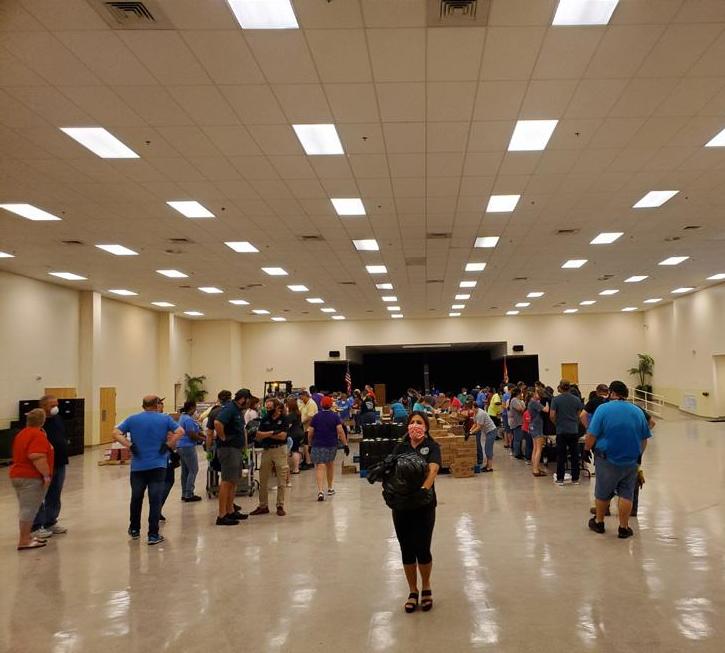
5 minute read
Managing Your Finances During the Pandemic
Contributed by Dt. Tara Y. Davis Ahmed Court No. 134 Tallahassee, Fla.
Most of the time, people do not know in advance they are going to lose their job. The news often comes as a complete and unwelcome surprise. As the COVID-19 Coronavirus continues to spread around the State of Florida and across the United States, staying healthy is a top priority. At the same time, having a monthly budget for the long term can help if you are experiencing tough financial times now and if you anticipate a loss of income soon. Reviewing your family budget should be a critical part of your COVID-19 response strategy.
Revise Your Budget
If you’re facing a job loss and don’t have a monthly budget for your household, make a household budgetimmediately. And if your current budget is based on your previous income, go through and analyze your expenses based on your new situation. Cutting costs can make getting through the current financial situation less stressful. Before you can do that, you first need to understand where and how you are spending money. Compare your expenses to your income. If your expenses are higher than your income, then look at adjusting your spending down to only the “essentials” – food, housing, utilities and transportation. If you are in disaster or emergency budgeting mode, prioritizing your expenses matters. Paying the rent or mortgage and keeping the utilities on should take precedence over buying clothes or dining out several times a week.
Trim whatever you can from your spending. Some other ideas to save money on a tight budget include: • Cancel cable and watch TV online. • Cancel lawn services and trips to the dry cleaners. • Raise your car and home insurance deductibles to lower your monthly premiums. • Cancel subscriptions: magazines, gym memberships or subscription boxes. • Keep the air conditioning turned off or the heat turned down to save money on utilities. • Keep lights turned off as much as possible to save money on your electric bill.
If you are worried you are going to be unable to pay for essential services such as electric, Internet, gas, or water during the current pandemic, call your provider and explain your situation. Many cities and private companies are halting service interruption due to nonpayment, waiving late fees, offering flexible payment plans, or even delaying payments altogether. Keep the lines of communication open and remember, you will get through it.
Prioritizing Debt: Which Bills do I Pay First?
Food and Medicine
The most important thing is your health and well-being. Take care of yourself first, then move on to the other priorities. Food, medicine, soap, and paper products are up there with shelter, heat, and hot water on the list of essentials.
Plan your meals for the week, make a list of the items you need, and go to the store once. The more you go to the store, the more likely you are to buy things you do not need. Also depending on your income, you may qualify for financial assistance with groceries. The Supplemental Nutrition Assistance Program, (aka SNAP, food stamps) helps to cover the cost of groceries for people with income below certain thresholds.
Mortgage or Rent
Keeping up with your housing payments is a must if you want to stay in your home. When money is tight and you are not sure you can pull together enough to make a payment one month, the best thing to do is talk to your landlord or lender. Many mortgage lenders have programs in place to help homeowners who are facing financial hardship. Your lender can review your options, such as forbearance or a loan modification. Forbearance means you do not make payments for a set period. Loan modification or refinance can lower the amount of your monthly payments. If you are a renter in the state of Florida, currently there is a moratorium on evictions and mortgage foreclosures. Most landlords will work with you if they are being kept informed about your financial situation -- because from a business standpoint, it is best for a landlord to work with an existing tenant. You can help your situation by suggesting a payment plan based on what you can afford. If you cannot pay the full amount of your rent, tell the landlord what you can pay and when you return to full-time employment, have a plan to make up the difference. For example, you can add an extra $100 to future rent payments until you can pay off the owed balance.
Utilities
After your mortgage or rent payment, the next most important bills are your utility bills: gas, water and sewage, and electricity. Fortunately, there are programs that exist to help people who need emergency financial assistance with paying the utilities. The first place to start is your local utility provider. They may have their own programs to help people who need assistance. Many utility companies can refer you to local energy assistance programs run by the government or local charities.
Car Loan & Insurance
If you have a car loan, it’s important to find a way to pay it each month. Just as you can call your mortgage company to work out a deal, you can call the lender that has your car loan to see if you can come to an agreement. Like mortgage companies, these lenders can also offer you loan modifications, refinancing, or forbearance. Loan modification or refinancing can lower the amount of your monthly payments, making it easier for you to afford the car. If you don’t have a car loan but you have a luxury vehicle, consider selling this vehicle and use the proceeds to purchase a less expensive model car so you won’t have to worry about expensive maintenance or repair bills. Car insurance is also very important. Florida law requires all car owners to have insurance. If you do not have insurance and are in an accident, your driver’s license may be suspended. If you must drive, do not let your car insurance lapse.
Phone Service
While you do need your phone to stay connected, you most likely do not need the most expensive cellphone plan, with multiple phone lines. Shop around and compare prices to see if you can get a better deal on your service. If you cannot get the cell phone provider to work with your situation, then purchase a “pay as go” phone until your situation improves.
Disclaimer:
This article gives general advice only. If you have a serious debt issue, check with local resources, non-profit and government agencies. Here are just a few: Benefits.gov (benefits.gov) The 2-1-1 Program (211.org) Career One Stop (careeronestop.org) Modest Needs (modestneeds.org)
(References: Forbes.com, CNBC.com, Washington Law Help) ______________________________ _________________________ Tara Y. Davis is a financial planner in Tallahassee, Florida.










